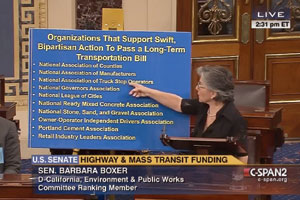Senior Reporter
Congress Passes 3-Month Patch to Continue Highway Funding

The Senate on July 30 approved both a House-passed, three-month extension of funding authority for highway programs and a six-year highway policy designed to reform several trucking regulations.
The $8 billion patch passed by 91-4 a day before the Highway Trust Fund was set to expire. The White House indicated President Obama would sign into law the short-term funding fix agreed to by both chambers.
Once enacted, the patch would mark the third funding extension of the trust fund’s authority in less than a year.
House and Senate Republican leaders celebrated the short-term bill’s passage, noting it would give them additional time to perfect the Senate-passed, six-year transportation measure.
“This multiyear, bipartisan legislation will give states and local governments the ability to plan for and construct critical infrastructure projects,” said Sen. John Thune (R-S.D.), chairman of the committee that oversees trucking policy.
“We all share the same goal of completing a long-term bill as soon as possible, and ensuring that critical programs do not shut down before we achieve that goal is the right thing to do,” added Rep. Bill Shuster (R-Pa.), chairman of the House Transportation and Infrastructure Committee.
The Senate advanced its six-year plan by a 65-34 vote. The House did not take up the Senate’s long-term bill, advancing only the short-term measure July 29 before adjourning for five weeks.
The Senate’s multiyear legislation would reform several programs managed by regulators, mainly the Federal Motor Carrier Safety Administration. For example, it would remove from public view safety scores that are part of FMCSA’s Compliance, Safety, Accountability program until after a comprehensive review takes place.
It also would pave the way for commercial drivers between 18 and 21 to drive trucks interstate, and it would allow trucking companies to use hair samples for drug testing drivers.
In passing the long-term bill, Sen. Barbara Boxer (D-Calif.), one of the bill’s authors, said, “We don’t have to stand here and show tragic photos of bridge collapses and hear about terrible stories of construction workers who can’t make it and have to have food stamps.”
The Congressional Budget Office said the six-year bill would keep highway programs funded for the first three years by using $46 billion in transfers from the Treasury’s general fund. The bill also relies on about $9 billion in offsets of the sale of part of the Strategic Petroleum Reserve.
The bill also would establish a national freight program and authorize $200 million in annual funding for a grant initiative for freight projects. It would boost funding for highway, public transportation and passenger rail programs. The legislation also would direct the secretary of transportation to establish design standards for transportation projects meant to safely accommodate both motorized and nonmotorized users.
An amendment to the bill to require the secretary to examine the effect of allowing twin 33-foot trailers to operate around the country was not taken up.
After the bill passed, Sen. Roger Wicker (R-Miss), that proposal’s sponsor, said he would “continue to fight against a harmful federal mandate requiring all states, including Mississippi, to allow twin 33-foot trailers within their jurisdictions regardless of state laws. I believe states are in the best position to make safety decisions about truck size.”
A fiscal 2016 Senate transportation funding bill would allow the use of twin 33-foot trailers nationwide. The use of longer pup trailers is strongly endorsed by many parcel and less-than-truckload carriers that are seeking to increase productivity.
House transportation leaders have not endorsed the Senate’s bill. The most recent long-term highway bill was signed into law in 2005 by President George W. Bush. It expired Sept. 30, 2009.
Transportation groups said the Senate’s six-year bill was a symbolic move meant to alleviate funding concerns around the country.
“Passage of a long-term bill is well overdue, and it is past time for Congress to provide states with the certainty they need to address the enormous backlog in critical highway and bridge improvements,” said Bill Graves, president of American Trucking Associations.
Pete Ruane, president of American Road and Transportation Builders Association, said advancing the patch and the six-year bill “should bring to a close once and for all claims that Congress needs ‘more time’ to develop a long-term reauthorization bill and Highway Trust Fund solution.”
“For more than a year, members of both parties and chambers have used this rationalization for kicking the reauthorization can down the road. The time for any further short-term extensions is over,” Ruane added.
Executive Director Bud Wright of the American Association of State Highway and Transportation Officials said he welcomed the short-term relief, but, like Ruane, he urged the House to follow the Senate’s lead and “pass a surface transportation bill as soon as possible when they return to D.C. in September.”

